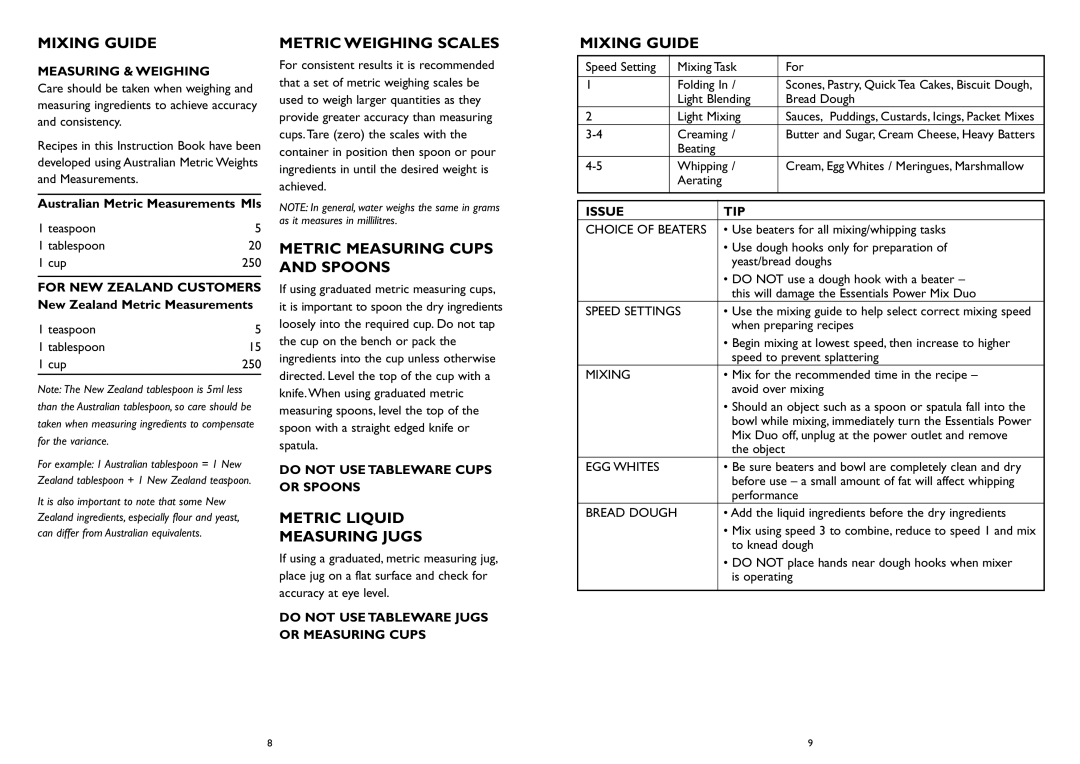
MIXING GUIDE
MEASURING & WEIGHING
Care should be taken when weighing and measuring ingredients to achieve accuracy and consistency.
Recipes in this Instruction Book have been developed using Australian Metric Weights and Measurements.
Australian Metric Measurements Mls
1 teaspoon | 5 |
1 tablespoon | 20 |
1 cup | 250 |
FOR NEW ZEALAND CUSTOMERS New Zealand Metric Measurements
1 teaspoon | 5 |
1 tablespoon | 15 |
1 cup | 250 |
|
|
Note: The New Zealand tablespoon is 5ml less than the Australian tablespoon, so care should be taken when measuring ingredients to compensate for the variance.
For example: 1 Australian tablespoon = 1 New Zealand tablespoon + 1 New Zealand teaspoon.
It is also important to note that some New Zealand ingredients, especially flour and yeast, can differ from Australian equivalents.
METRIC WEIGHING SCALES
For consistent results it is recommended that a set of metric weighing scales be used to weigh larger quantities as they provide greater accuracy than measuring cups.Tare (zero) the scales with the container in position then spoon or pour ingredients in until the desired weight is achieved.
NOTE: In general, water weighs the same in grams as it measures in millilitres.
METRIC MEASURING CUPS AND SPOONS
If using graduated metric measuring cups, it is important to spoon the dry ingredients loosely into the required cup. Do not tap the cup on the bench or pack the ingredients into the cup unless otherwise directed. Level the top of the cup with a knife.When using graduated metric measuring spoons, level the top of the spoon with a straight edged knife or spatula.
DO NOT USE TABLEWARE CUPS OR SPOONS
METRIC LIQUID
MEASURING JUGS
If using a graduated, metric measuring jug, place jug on a flat surface and check for accuracy at eye level.
DO NOT USE TABLEWARE JUGS OR MEASURING CUPS
MIXING GUIDE
Speed Setting |
| Mixing Task |
| For | ||
|
|
|
|
|
| |
1 |
| Folding In / |
| Scones, Pastry, Quick Tea Cakes, Biscuit Dough, | ||
|
| Light Blending |
| Bread Dough | ||
2 |
| Light Mixing |
| Sauces, Puddings, Custards, Icings, Packet Mixes | ||
| Creaming / |
| Butter and Sugar, Cream Cheese, Heavy Batters | |||
|
| Beating |
|
|
| |
| Whipping / |
| Cream, Egg Whites / Meringues, Marshmallow | |||
|
| Aerating |
|
|
| |
|
|
|
|
|
|
|
|
|
|
|
| ||
ISSUE |
|
| TIP |
| ||
CHOICE OF BEATERS |
| • Use beaters for all mixing/whipping tasks | ||||
|
|
|
| • Use dough hooks only for preparation of | ||
|
|
|
| yeast/bread doughs | ||
|
|
|
| • DO NOT use a dough hook with a beater – | ||
|
|
|
| this will damage the Essentials Power Mix Duo | ||
SPEED SETTINGS |
| • Use the mixing guide to help select correct mixing speed | ||||
|
|
|
| when preparing recipes | ||
|
|
|
| • Begin mixing at lowest speed, then increase to higher | ||
|
|
|
| speed to prevent splattering | ||
MIXING |
|
| • Mix for the recommended time in the recipe – | |||
|
|
|
| avoid over mixing | ||
|
|
|
| • Should an object such as a spoon or spatula fall into the | ||
|
|
|
| bowl while mixing, immediately turn the Essentials Power | ||
|
|
|
| Mix Duo off, unplug at the power outlet and remove | ||
|
|
|
| the object |
| |
EGG WHITES |
|
| • Be sure beaters and bowl are completely clean and dry | |||
|
|
|
| before use – a small amount of fat will affect whipping | ||
|
|
|
| performance | ||
BREAD DOUGH |
|
| • Add the liquid ingredients before the dry ingredients | |||
|
|
|
| • Mix using speed 3 to combine, reduce to speed 1 and mix | ||
|
|
|
| to knead dough | ||
|
|
|
| • DO NOT place hands near dough hooks when mixer | ||
|
|
|
| is operating | ||
|
|
|
|
|
|
|
8 | 9 |
